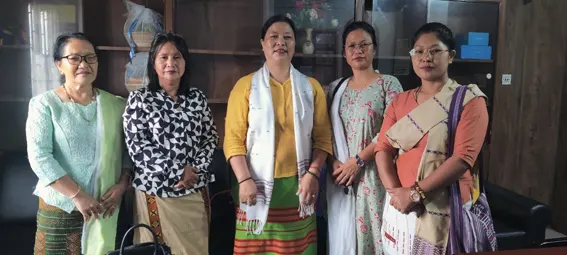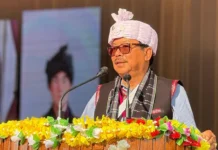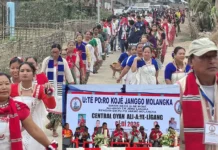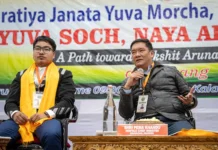ITANAGAR, 14 Jul: Following the report of serious allegation of sexual harassment of a policewoman, allegedly by the former West Kameng SP, the Arunachal Pradesh Women’s Welfare Society (APWWS) has raised serious questions regarding the handling of the case.
Representatives of the APWWS met the Arunachal Pradesh State Commission for Women (APSCW) Chairperson Kenjum Pakam and her team here on Friday to know about the action taken by the commission.
The commission informed the APWWS that it received a complaint letter from the victim, and on 3 July wrote to the chairman of the Internal Complaint Committee (ICC) to intervene into the case and furnish the status report.
The APWWS had questioned the ICC in the West Kameng SP office regarding transferring the case to the Local Complaint Committee (LCC).
When the matter is under inquiry, the alleged accused shouldn’t have been transferred out of the state till the completion of inquiry, the APWWS said.
“We question the conduct of the police department in dealing with the complaint,” it said.
APWWS president Kani Nada Maling said that “the very objective of constituting of an ICC within an organisation is to address and resolve complaints of sexual harassment at workplace.
“It is an in-house mechanism for dealing with complaints of sexual harassment and also for providing a safe environment for the employees,” she said.
“Though the ICC does not have the power to impose penalties, the committee may recommend disciplinary action against the accused if there are findings. The ICC is an important component of the Act which aims to protect employees vis-à-vis sexual harassment at workplace.
“There are challenges in implementation of the Act in the state due to lack of sensitisation,” she said, adding that “the state government should work on sensitising its workforce, particularly the heads of departments, and frame proper guidelines to ensure that the justice delivery system under this Act is properly implemented.”
Maling further said that the members of ICCs and LCCs across the state “should undergo training to equip themselves with various sections of the Act.”
She lamented that “there is no proper office and no honorarium paid to the members and no funds for carrying out the work and creating awareness.”
“Just appointing of members for the sake of appointing them by the district administrations and various departments won’t help in delivery of justice,” she said.
Maling was accompanied by APWWS assistant secretary-general Taku Yasap Tadar.





